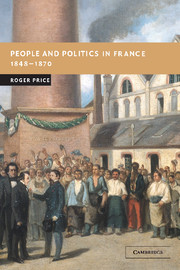Book contents
- Frontmatter
- Contents
- Acknowledgements
- List of abbreviations
- Introduction
- 1 Dominant classes: the social elites
- 2 Coming to terms with ‘democracy’
- 3 Aspiring social groups: the middle classes
- 4 Peasants and rural society: a dominated class?
- 5 Peasants and politics
- 6 The formation of a working class
- 7 The working-class challenge: socialisation and political choice
- Conclusion
- Select bibliography
- Index
1 - Dominant classes: the social elites
Published online by Cambridge University Press: 28 August 2009
- Frontmatter
- Contents
- Acknowledgements
- List of abbreviations
- Introduction
- 1 Dominant classes: the social elites
- 2 Coming to terms with ‘democracy’
- 3 Aspiring social groups: the middle classes
- 4 Peasants and rural society: a dominated class?
- 5 Peasants and politics
- 6 The formation of a working class
- 7 The working-class challenge: socialisation and political choice
- Conclusion
- Select bibliography
- Index
Summary
INTRODUCTION
A social elite might be defined as an aristocracy of birth, wealth and of influence, the latter made up of the key decision makers in both the public and private sectors of society. Traditionally ‘notables’ had been landowners and land remained a privileged form of investment. A process of interpenetration of ‘traditional’, partly noble, and ‘modern’ elites had long been under way, however. Economic and social change and the growing wealth and complexity of capitalist society facilitated an expansion of the elite to absorb increased numbers of businessmen, bureaucrats, and professionals. Thus, opportunities for upward mobility led to a partial renewal of the social elites, although its scale remained limited by the importance of inheritance as the main source of wealth and status. Moreover, although the ultimate symbol of success was no longer entry into the nobility, and economic achievement counted for more, cultural values derived from the ‘ancient’ landowning class continued to define social mores. The renewed experience of revolution in 1848 and the intense ‘social fear’ it revived also served to encourage the development of ‘class’ consciousness and a greater sense of solidarity.
Elite membership thus depended on the mutually reinforcing combination of economic, social, and political power, which gave its members both status and authority. It was made possible by the possession of wealth, which financed a particular lifestyle and culture. It was signified by acceptance within supportive family and social networks.
- Type
- Chapter
- Information
- People and Politics in France, 1848–1870 , pp. 19 - 63Publisher: Cambridge University PressPrint publication year: 2004



